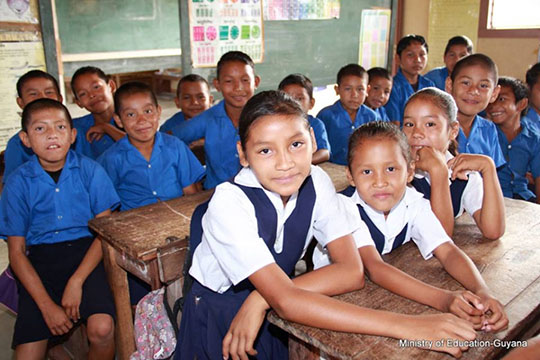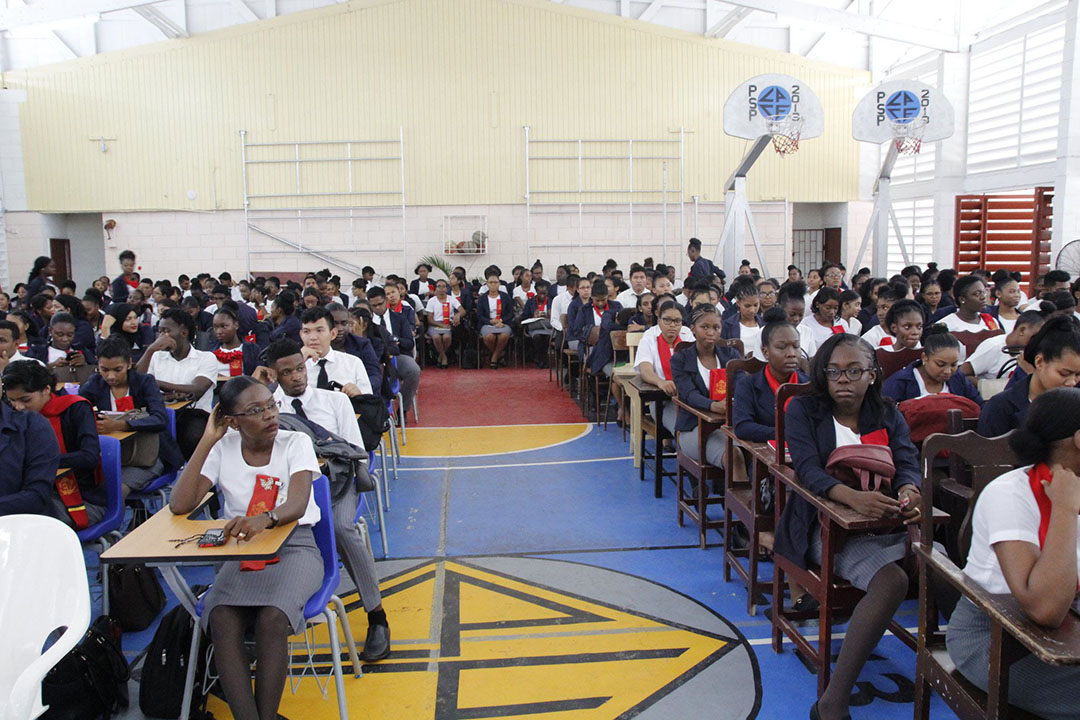There is no mistaking the challenges associated with delivering quality education that matches national aspirations and developmental goals in Guyana. The challenges range from the high and continually rising cost of education delivery in what is still an underdeveloped country, not least the issue of affordability insofar as providing the human and material resources necessary for effective execution of that task is concerned.
Poverty in a number of communities is also barrier to securing access to education. There are still homes in Guyana where economic circumstances limit and in some instances prohibit altogether attendance at school. Increasing the number of school-age children who are exposed to classroom-based, structured teaching is inextricably linked to improving the economic circumstances in their homes.
There are, as well, communities too in which the social environment impacts negatively on the value placed on children receiving an education. There can be no question that the country’s high crime rate and the tender age with which many young Guyanese turn to crime is, in considerable measure, a function of them having had only a limited experience, or sometimes none at all, of a formal school setting and the values that such a setting imparts.

As a society we pay considerable attention to the importance of education in what we say. Public pronouncements have, in various ways, underscored the importance of education to nation building. What is also apparent is that the advent of oil & gas as a factor in the Guyana economy, has created the need for a ‘new curriculum’ designed to turn out skills that can match our developmental aspirations. This factor has intensified the public discourse though actualisation is a challenge for which we remain ill-prepared.
Leaving aside the long-standing scarcity of teachers and material resources necessary for the delivery of the conventional curriculum, Guyana is only now seeking to create a regimen of technical education that matches its developmental aspirations… down the road. Efforts to implement a regimen of STEM (Science, Technology, Engineering and Mathematics) education have bared a decided level of unpreparedness at every level. Building a teaching resource base to match our technological needs, going forward, could prove to be one of our greatest education-related challenges.
With particular reference to oil & gas there is an entire ‘curriculum’ to deliver that require the types of skills training that have not, traditionally, been part of the national curriculum. Change, therefore, has to begin at the level of primary, secondary and vocational education delivery, and there is no real evidence, as yet, that the requisite curriculum change is taking place.
On the whole, conventional teacher training, for example, remains largely in the traditional mould. ‘Smart’ classrooms remain part of the bureaucratic ‘gaff’ while ‘chalk and talk’ still prevails. National appreciation of the importance of infusing a strong STEM dimension into the curriculum is still not evidenced in what is happening at the school level.
There are two key problems here. The first of these has to do with the fact that there is no intellectual infrastructure that allows for the immediate-term development of an effective STEM curriculum, the presence and considerable contribution of the organisation STEMGuyana notwithstanding. The second is that there are no indications that one is on the horizon. For sure, we ‘talk the talk’ as most other countries do. ‘Walking the walk,’ however, requires a plan and there are, up until now, no discernable plans to seriously shift gears towards a STEM-focussed curriculum. The simple fact is that as presently structured, the Ministry of Education is lacking in the capacity to independently plan, execute and sustain an across-the-board STEM-focussed curriculum in our schools. This is not, in itself, a criticism of the Ministry of Education. It is a pure statement of fact which the Ministry itself can hardly deny.
To return for the moment to the conventional education system including the resources associated with effective curriculum, other questions arise. Functionaries in the education system itself continue to debate issues like the volumes and quality of teachers graduating from training in the CPCE, whether or not there is anything even remotely resembling a balanced distribution of teachers across the country and whether the strictly limited incentives associated with becoming a professional teacher are sufficient for the job at hand. While one agrees with President Granger who, just recently, publicly pronounced on the importance of having the untrained teacher become a thing of the past, the other issue here (and we do not believe that it was a consideration that was absent from the mind of the President) has to do with the quality of the trained teacher who graduates from the CPCE.
Then there is also the issue of the shortage of trained male teachers in the system, an issue, incidentally, that is also currently under discussion in Trinidad and Tobago. The fact of the matter is that in various important ways, male teachers add considerable value to the system and their limited numbers continue to be felt in our school system. Not least among the reasons proffered for the smaller numbers of males in the teaching system is the fact that it does not offer the material returns to match the financial obligations of heads of households.
For reasons best known to itself the Ministry of Education has, traditionally, opted to mostly keep its challenges to itself. Public fora and other events associated with education and education delivery have tended, by and large, to remain largely quiet about the challenges. Issues to do with quality of education delivery, discipline in school, drug use among schoolchildren and resource challenges are rarely if ever discussed publicly by the Ministry of Education. The national Parent/
Teacher structure which, if managed effectively, can contribute significantly to the qualitative development of the national education system is not only inconsistent in its manifestation but failing, in many instances to perform the particular functions that it should. There are also still considerable question marks over the role being played by School Boards in some state schools.
One of the more important current issues of the national education agenda is that of curriculum change; and yet, over the considerable period that the notion has been bandied about, there has been a conspicuous absence of any planned and sustained campaign to involve the public as a whole in this discourse. Curriculum change goes to the very heart of the direction in which our education system will be headed for some time to come, so that the Ministry of Education has an obligation to bring parents and others into the ‘loop’ on this issue. It is yet to do so. Curriculum change, after all, is the rudder that will dictate the course of our education system in the period ahead… and that is everybody’s business.
In an environment (not just domestic but global, as well) where image is everything, it would hardly be surprising if the Ministry of Education becomes somewhat piqued over what, in fact, is a cursory, but critical glance at some aspects of our education system that need to be addressed with a sense of urgency if education, on the whole, is to keep pace with our developmental aspirations. Indeed, recently, President Granger himself has been making some instructive remarks about education and its role in societal development. His remarks, for example, at a recent forum, regarding the importance of having the untrained teacher become a thing of the past in our education system, was not intended to be a criticism of those who, at this point in time, remain untrained. On the contrary it should be seen as an urging on the part of the President that those untrained teachers move with due haste to become trained. By the same token, the Ministry of Education must continue to strive to give leadership to the pursuit of an enhanced and relevant education system.
The fuss and the concern over the state and direction of Guyana’s education is neither alarmist nor is it overdone. On the whole, there is a recognition that our society is changing and that the stability and predictability of our education system are critical elements in the charting of that change.






